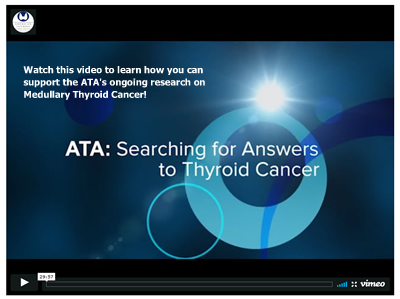Clinical Thyroidology for the Public summarizes selected research studies discussed in the previous month’s issue of Clinical Thyroidology, an official publication of the American Thyroid Association. Editor-in-chief, Alan Farwell, MD, FACE
Volume 10 Issue 11
Available in pdf format for saving and printing and Web page format for viewing online
PDF Format for Saving and Printing
Clinical Thyroidology for the Public Volume 10 Issue 11 (PDF file, 11.1 MB)
TABLE OF CONTENTS – Web Format
THYROID CANCER Are there racial differences in the care of patients with thyroid cancer?
Thyroid cancer is one of the fastest rising cancers, especially in women. National guidelines have provided recommendations on the management of thyroid cancer. While the prognosis of thyroid cancer is usually excellent, decreased survival has been observed among the minority of patients who receive thyroid cancer care that is not aligned with either of the guidelines. This study was done to compare differences in the care of patients with thyroid cancer between the years 1998 to 2012.
Jaap K et al Disparities in the care of differentiated thyroid cancer in the United States: exploring the National Cancer Database. Am Surg 2017;83:739-46.
(PDF File for saving and printing, 659 KB)
THYROID AND PREGNANCY Levothyroxine therapy of subclinical hypothyroidism or hypothyroxinemia in pregnancy does not affect brain function in the offspring
While mild/subclinical hypothyroidism in the mother is associated with pregnancy complications, the effects on brain development in the baby is less clear. This is also true with hypothyroxemia in pregnancy. The current study was designed to examine the results of treatment for subclinical hypothyroidism or hypothyroxinemia detected in early pregnancy on the basis of IQ assessed in children at 5 years of age.
Casey et al for the Eunice Kennedy Shriver National Institute of Child Health and Human Development Maternal–Fetal Medicine Units Network. Treatment of subclinical hypothyroidism or hypothyroxinemia in pregnancy. N Engl J Med 2017;376:815-25.
(PDF File for saving and printing, 620 KB)
THYROID AND PREGNANCY Thyroid dysfunction in pregnancy
Hypothyroid women on thyroid hormone replacement often require adjustments in levothyroxine dosing during pregnancy, usually a higher dose. The best protocol for managing this dose change is unknown, including the magnitude and timing of the dose change. These authors performed a clinical trial to compare two protocols for adjusting thyroid hormone doses in hypothyroid women during pregnancy.
Sullivan SD et al. Randomized trial comparing two algorithms for levothyroxine dose adjustment in pregnant women with primary hypothyroidism. J. Clin Endocrinol. Metab. 2017. 102: 3499-3507.
(PDF File for saving and printing, 1 MB)
THYROID BLOOD TESTS Inconsistent ordering of thyroid blood tests in the U.S.
Overall, thyroid blood testing has steadily increased over the past few decades, corresponding with rising healthcare costs. Many thyroid tests are overused and may be inappropriate for the type of thyroid condition suspected. This study was done to assess how frequently certain thyroid blood tests were ordered in the U.S. across multiple healthcare organizations.
Lin, DC et al for the Thyroid Benchmarking Group. Multicenter Benchmark Study Reveals Significant Variation in Thyroid Testing in the United States. Thyroid 27(10): 1232-1245, 2017.
(PDF File for saving and printing, 615 KB)
THYROID CANCER Specific RET mutations and cancer outcomes in MEN2A medullary thyroid cancer
Medullary thyroid cancer is a rare cancer and is caused by mutations in the RET oncogene. The 2015 ATA guidelines categorize RET mutations into 3 categories – low, moderate, and high risk. This study examined the association of these mutations and the aggressiveness of the cancer.
Voss RK et al Medullary thyroid carcinoma in MEN2A: ATA moderate- or high-risk RET mutations do not predict disease aggressiveness. J Clin Endocrinol Metab 2017;102:2807-13.
(PDF File for saving and printing, 717 KB)
THYROID CANCER The merits of ultrasound screening for familial non-medullary thyroid cancer are strongly dependent on the number of affected family members
When a patient is diagnosed with medullary thyroid cancer, quite often other members of their family are screened for the same cancer. Most patients with non-medullary thyroid do not have any family members with the same cancer but some do have a familial form. The benefit of screening family members after an individual gets diagnosed with non-medullary thyroid cancer is not known. The objective of this study was to identify criteria that would predict benefit of screening family members of patients with non-medullary thyroid cancer.
Klubo-Gwiezdzinska J Results of screening in familial nonmedullary thyroid cancer. Thyroid 2017 Aug;27(8):1017-1024.
(PDF File for saving and printing, 619 KB)





